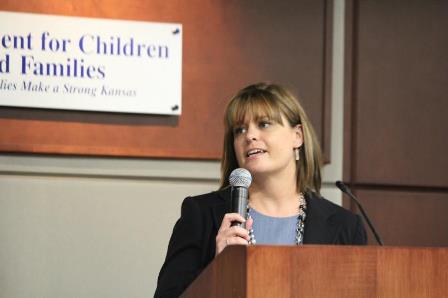Group aims to help parents deal with difficult behaviors
by Meg Wingerter, KHI News Service
Love and good intentions aren’t always enough when it comes to adopting kids who have a history of trauma, according to a nonprofit that is partnering with the state to help parents after they adopt.
Gail Cozadd, east region program director for the Kansas Children’s Service League, said adoptive parents face significant stress and have higher divorce rates than other couples.
“All children will challenge you, but an adoptive child who has been through a lot of trauma will take that to the Nth degree,” she said.
KCSL and the Kansas Department for Children and Families unveiled a plan Tuesday to offer more resources to adoptive parents. DCF is paying for one staff person at KCSL to oversee the resources.
DCF will send KCSL the contact information for each new adoptive family so KCSL can send them a packet of information about resources and tell them how to connect with a support group in their area, Cozadd said. In rural areas, it may have to be an online group, she said.
They also will offer weekend retreats for adoptive parents to work on their marriages and learn about coping with children’s challenging behaviors, Cozadd said. The idea is that parents who know they have support will be less likely dissolve their adoption by sending the child back to foster care, to divorce or to abuse or neglect a child due to their frustration, she said.
“Anything you can do to prevent that is what you want to do,” she said.
Deneen Dryden, DCF director of prevention and protection services, said about 350 children currently are available for adoption in Kansas. The department is particularly focused on finding families interested in the 160 available teenagers, who tend to be harder to match, she said. DCF reported 755 children were adopted from foster care in the 2016 fiscal year.
Gov. Sam Brownback, who spoke briefly at the announcement, said he would like to see enough interest that families will be waiting to adopt children. He said he, his wife and their biological children had benefited from the decision to adopt two more children.
“The key is to open your heart and see the love, not the problems,” he said. “I hope that Kansas families that listen to this will open up their hearts and not harden them.”
The nonprofit KHI News Service is an editorially independent initiative of the Kansas Health Institute and a partner in the Heartland Health Monitor reporting collaboration. All stories and photos may be republished at no cost with proper attribution and a link back to KHI.org when a story is reposted online.
To see more, visit http://www.khi.org/news/article/kansas-unveils-resources-to-support-adoptive-parents.

